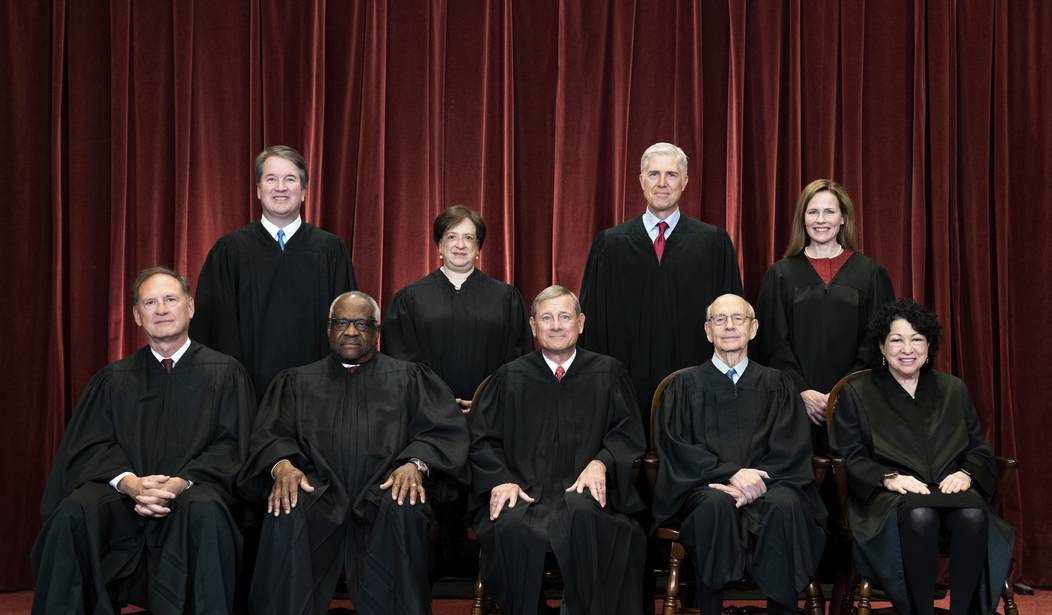Yesterday, Ed reviewed the Supreme Court ruling in West Virginia v EPA, in which the court ruled that the EPA had significantly overstepped its authority in the broad regulation of carbon emissions. The ruling was grounded in what’s known as the “major questions doctrine.” (Also variously known as the major rules doctrine or the major cases doctrine.) This set off another round of panic and hysteria among liberals, some of whom declared that the court had decided that “the world should burn.” Others who are fans of congressional oversight of the executive branch welcomed the decision as a victory. We haven’t seen very much of this doctrine in recent decades, but if this is the direction that the recently altered court is taking, it’s a potentially hopeful sign for the future. (Wall Street Journal)
“I have directed my legal team to work with the Department of Justice and affected agencies to review this decision carefully and find ways that we can, under federal law, continue protecting Americans from harmful pollution, including pollution that causes climate change,” Mr. Biden said.
The principle articulated by the court, known as the “major questions doctrine,” was mentioned in earlier cases but is being recognized more explicitly now, said Gautam Hans, a law professor at Vanderbilt University.
“The court has now really explicitly relied on this doctrine to limit the EPA’s authority, and other regulatory agencies are going to be more cautious now that they have to navigate this,” Mr. Hans said.
With Congress often mired in gridlock, Mr. Biden and his Democratic predecessors have used regulation instead of legislation to advance their policy agendas, Mr. Hans said.
The infrequently cited and admittedly vague major questions doctrine states that in “extraordinary” cases involving matters of great “economic and political significance,” federal agencies must be able to point to specific Congressional authorization for their actions. While there is certainly some wiggle room for the court to define what constitutes “great economic and political significance,” there should be few questions among honest observers that sweeping restrictions on carbon emissions affecting most major industries that would raise prices and impact productivity across the nation should qualify.
Since Ed already broke down the EPA decision, I wanted to take this opportunity to consider some other areas where the court could use this tool to address imbalances in the federal government. Going back more than a century, the Supreme Court has shown an increasing level of deference to the executive branch, frequently at the expense of the legislative branch’s power of oversight. This has shown up in the continually increasing use of executive orders by presidents from both parties as well as the broad proclamations coming from unelected officials in any number of federal agencies. If you need one glaring, recent example, I will simply point you toward the nearly godlike status afforded to one Doctor Anthony Fauci.
Granted, the EPA has consistently been one of the worst offenders in this area. I seriously doubt that when Congress created the Renewable Fuel Standard as part of the Energy Policy Act of 2005 they foresaw it spiraling out of control in the way that it has. Few may remember that in addition to providing funding to subsidize ethanol and other renewable fuels, the act also subsidized the production of oil and gas, coal, and energy transmission infrastructure. But more than 15 years later, it’s used almost exclusively as a tool to punish the oil and gas industry and put coal mines out of business. The sad state of our electric grid tells us how little attention has been paid to it.
As the WSJ article points out, this tendency to rely on directives from federal agencies to advance the President’s agenda rather than having legislation passed has accelerated quickly under Joe Biden’s administration, though previous presidents have embraced that sort of autocratic authority as well. The FEC, the Department of Energy, The SEC, and even the Treasury Department have issued new mandates, all in the name of supposedly combatting climate change.
In other cases, the executive branch has simply flouted laws passed by Congress. The Biden administration canceled multiple auctions for drilling leases on federal lands last year. Perhaps the court could remind the White House that those leases are mandated by federal law and are to be held on a schedule that Congress clearly defined. And yet nobody seems to be inclined to remind the President of this.
In another stunning example, the President has been openly musing about canceling vast amounts of student debt based on nothing but the power of the pen and the phone. In fact, he’s already canceled portions of that body of debt. Congress has never voted on that issue and it certainly appears to be something that will be of “economic significance,” doesn’t it? The list goes on. We should welcome the return of the major questions doctrine and encourage Congress to step up and do the job assigned to it in the Constitution. If they want to push the President’s agenda forward, build consensus and do it through the regular legislative process. If they disagree with parts of that agenda, rein it in using the same method.








Join the conversation as a VIP Member